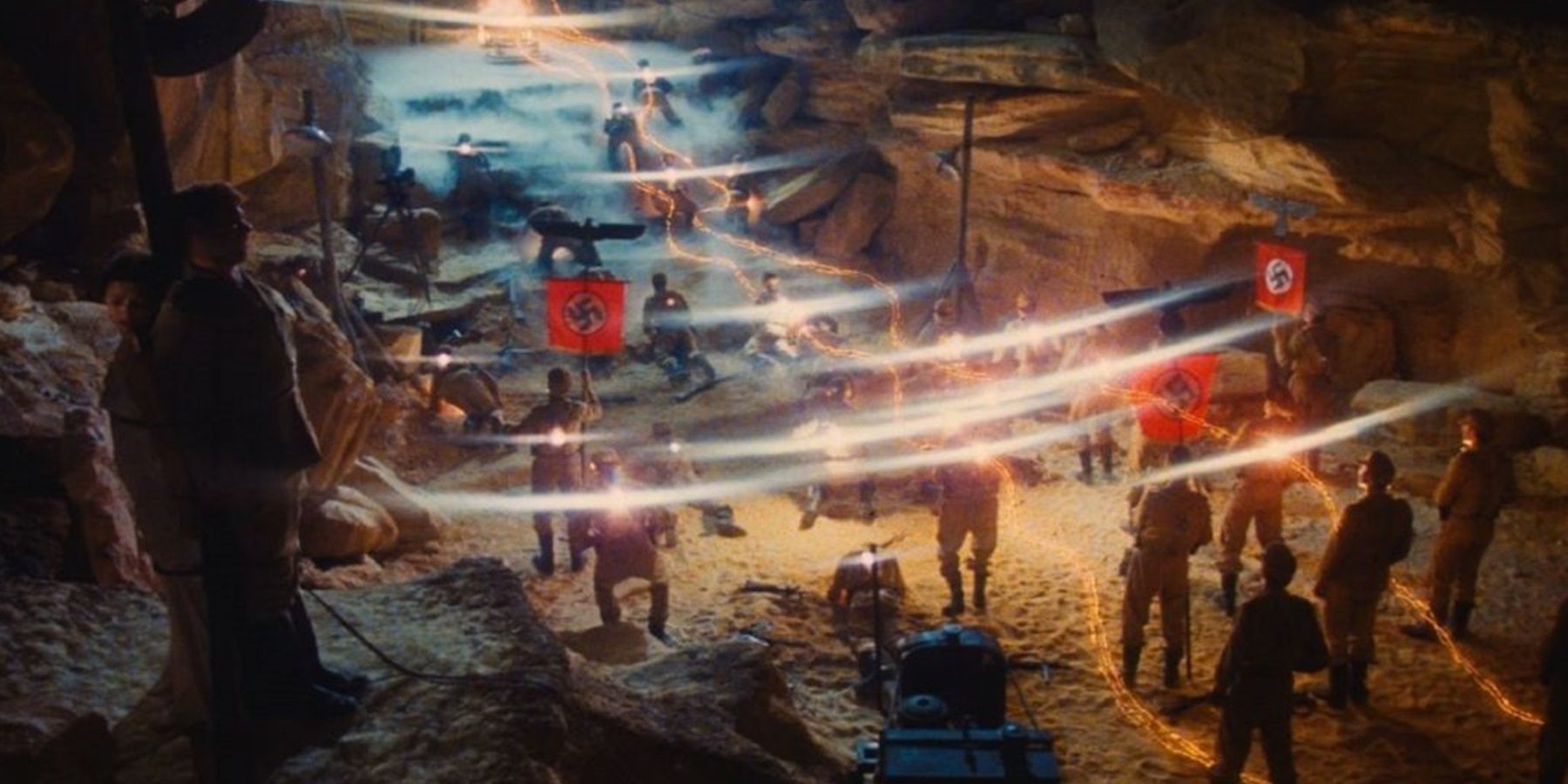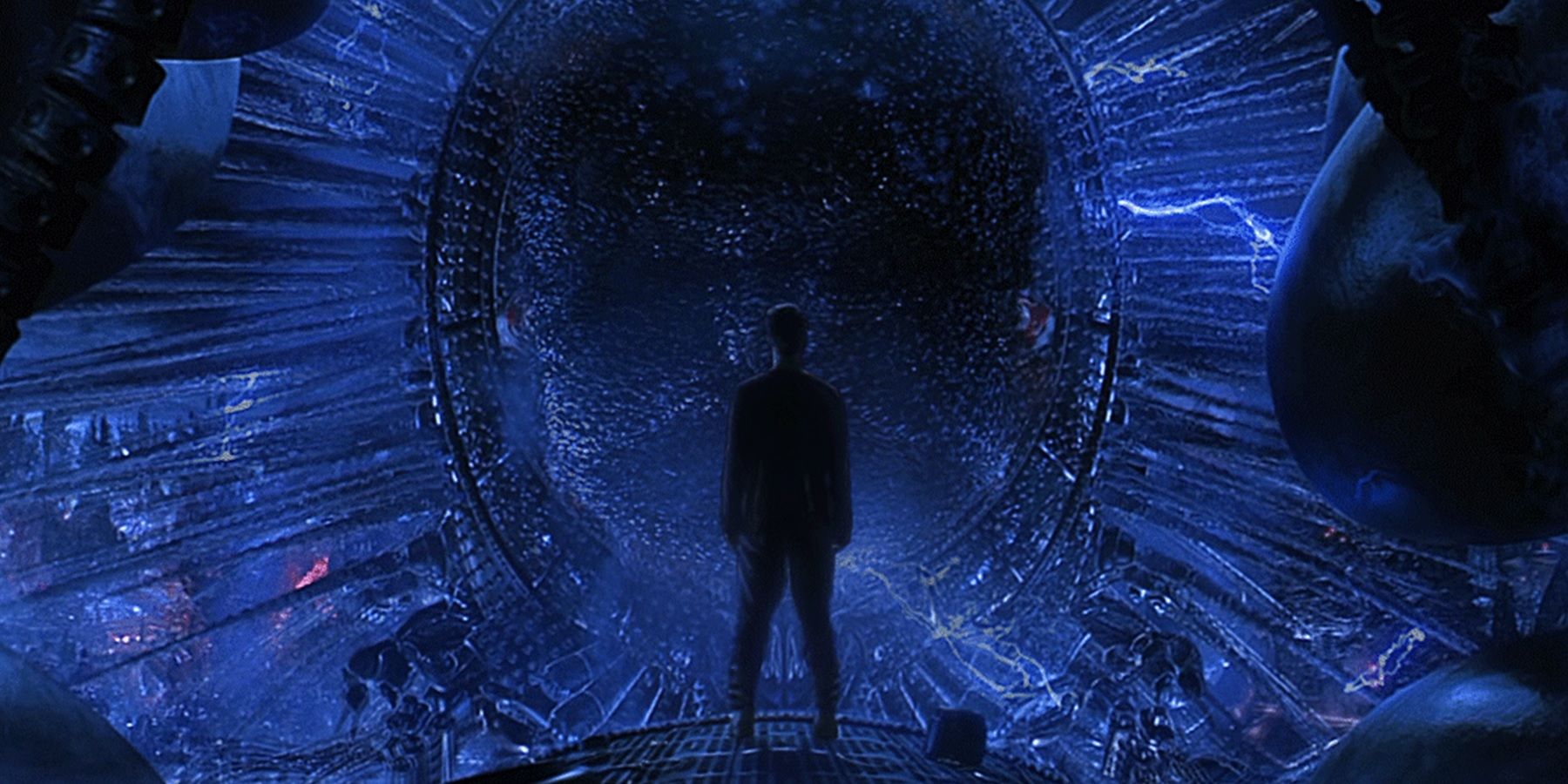“Deus ex machina” is one of the most commonly cited tropes in blockbuster cinema. It’s also one of the most commonly misunderstood, because even the English translation of its Latin name – “god from the machine” – doesn’t define itself very clearly. Broadly, a “deus ex machina” is a convenient coincidence that gets a character out of a jam in a story. The trope has its roots in ancient Greek theater. When the hero was out of options and facing certain death, an actor dressed as a god would be lowered down onto the stage on a pulley system to save them with divine intervention at the last minute.
Since it’s a nice, easy way to solve a story problem, the “deus ex machina” trope can be seen in all kinds of stories. A classic early example of Hollywood’s use of this trope is in The Wizard of Oz. When the Wicked Witch of the West sets the Scarecrow on fire, Dorothy throws a bucket of water over him to put it out. Some of the water splashes on the Witch and water just so happens to be her greatest weakness. She starts melting – apropos of nothing – and the goons that surround Dorothy and the heroes suddenly start celebrating her death.
Steven Spielberg has employed a “deus ex machina” in some of his most popular movies. In Raiders of the Lost Ark, after Indy fails to stop the Nazis, God himself unleashes his wrath through the opened Ark of the Covenant. In E.T. the Extra-Terrestrial, when Elliott and his friends are stopped by a police patrol while trying to escape with the alien, it turns out E.T. can make bicycles fly. At the end of Jurassic Park, the dinosaurs chasing after the heroes – a T-rex and a pair of velociraptors – lose interest in eating them and fight each other instead.
God From The Machine
As the screenwriters of studio tentpoles are faced with tighter and tighter deadlines, the “deus ex machina” is appearing more and more regularly in the modern blockbuster landscape. There are countless examples from the Bond movies, especially when the villain sends 007 to an elaborate instrument of death instead of just shooting him (a motif hilariously lampooned in Austin Powers). In the final battle of Avengers: Endgame, at the exact moment that Thanos orders his warships to fire upon the battlefield and wipe out everybody, Captain Marvel shows up and uses her near-unlimited power to punch a giant hole through the Mad Titan’s fleet.
The final battle in Star Wars: The Rise of Skywalker is an overstuffed jumble of deus ex machinas. Every major moment from the climactic Exegol set-piece relies on a brand-new Force ability that’s never been seen or even mentioned before. Suddenly, Rey is able to transport a lightsaber across physical space so Ben Solo can slaughter the Knights of Ren, and Ben is able to transfer his lifeforce into Rey to bring her back to life. There’s a hilarious spoof of deus ex machinas in Monty Python and the Holy Grail when King Arthur and his knights are being chased through a cave by the Legendary Black Beast of Aaaaargghh and they only manage to survive the encounter because the animator drawing the monster dies.
The Matrix’s Literal Deus Ex Machina
In The Matrix Revolutions, the Wachowskis realized the “deus ex machina” trope literally with an actual machine god. Just when the machines are about to decimate Zion, Neo goes to the machines’ city to propose peace to their never-before-mentioned godly supercomputer – who is actually called “Deus Ex Machina” – and, based on that conversation, Deus Ex Machina calls off its war with humanity. One of the most notorious deus ex machinas in Hollywood history can be found in the critically panned Matt Damon/Emily Blunt sci-fi thriller The Adjustment Bureau. When the protagonists are surrounded by bad guys with seemingly no hope of escape, they kiss. Suddenly, all the bad guys are gone and they’re told that God himself stepped in to give them the happy ending that they deserved.
The “deus ex machina” is a controversial narrative technique because it relies on the characters being saved by coincidence or divine intervention as opposed to their own quick thinking and decisive action. Brian Cox’s spot-on satirical portrayal of screenwriting guru Robert McKee in Spike Jonze’s self-aware gem Adaptation is defined by his hatred of deus ex machinas. Inspired by McKee, the movie’s screenwriter protagonist Charlie Kaufman turns the deus ex machina at the end of his script into a different trope: Chekhov’s gun. Played to hysterical effect in Shaun of the Dead, the “Chekhov’s gun” principle suggests that, if a gun is introduced in the first act of a play, it needs to go off by the end. This kind of plant-and-payoff is much more satisfying than a standard deus ex machina, because it’s not a random left turn; it pays off something that was set up earlier in the movie.



